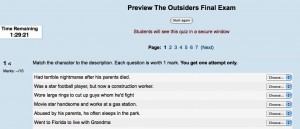Description
In addition to creating an exam for my LMS course site (see assessment page), I also chose to add a student survey to Module #4. The Constructivist On-line Learning Environment Survey (COLLES) in Moodle is a set of statements that allows learners to identify their preferred learning environment or their actual learning environment (Cole & Foster, 2008). I have elected to use a combination survey that covers both. In total, the students will respond to 50 survey items during class time.
Rationale
Timely and effective feedback is a vital component of any learning design (Gibbs & Simpson, 2004). In my experience, feedback is mostly given by instructors to students and opportunities for students to provide feedback to instructors are often ignored. The COLLES survey provides an excellent chance for students to reflect on their learning needs and to share that information with their instructor. Feedback then, in the same way in which it can support student learning, may also promote instructor learning. Because my LMS course site is my first, I value the opportunity to illicit student feedback about the effectiveness of my course design. I want to know what is and is not working well and I want to know this early enough in the course so that I may make changes to improve the learning experience for my students. The COLLES survey, in my opinion, is also about getting to know my learners and assessing their learning styles and tastes. In my rather extensive experience as a student, I have come across only a handful or two of teachers who were interesting and willing to give their learners a chance to give formal feedback to them for the purpose of improving a course. I’d love to give my learners this chance, which is why I’ve chosen to position the survey at the half-way point of my course. I foresee students willingly using the survey during class time and appreciating the opportunity to share their opinions. Moodle made it easy to add the survey tool and I’ll be able to view and download the responses.
This is, of course, not the only assessment activity I have designed in my LMS course. I have already included assessment tools for several other modules. I just wanted to take a chance and try something new here.
References
Cole, J. and Foster, H. (2008). Using moodle: Teaching with the popular course management system. Sebastopol: CA. O’Reilly Media Inc.
Gibbs, G. and Simpson, C. (2005). “Conditions under which assessment supports students’ learning.” Learning and Teaching in Higher Education Accessed online 24 June 2009 http://www.open.ac.uk/fast/pdfs/Gibbs%20and%20Simpson%202004-05.pdf
